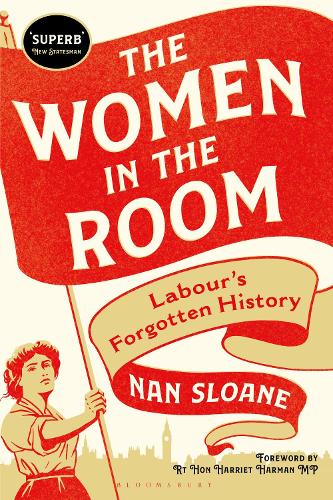
The Women in the Room: Labours Forgotten History
(Paperback)
Publishing Details
The Women in the Room: Labours Forgotten History
By (Author) Nan Sloane
Bloomsbury Publishing PLC
Bloomsbury Academic
14th July 2022
United Kingdom
Classifications
General
Non Fiction
Left-of-centre democratic ideologies and movements
Gender studies: women and girls
Political parties and party platforms
324.24107082
Physical Properties
Paperback
280
Width 156mm, Height 232mm, Spine 16mm
460g
Description
In February 1900 a group of men representing trade unionists, socialists, Fabians and Marxists gathered in London to make another attempt at establishing an organisation capable of getting working-class men elected to Parliament. The body they set up was the Labour Representation Committee; six years later when 29 of its candidates were elected to the House of Commons, it changed its name to the Labour Party. No women took part in that first meeting, but several watched from the public gallery. Amongst them was Isabella Ford, an active socialist and trade unionist who would have been familiar to most of the men assembled below. She had been asked by her friend, Millicent Fawcett, to attend and report back on what happened. A few years later she would become the first woman to speak at a Labour Party conference, moving a resolution on votes for women but, at the Partys inception in 1900, she and every other woman in the hall was silent. Throughout Labours history, even in its earliest years, women were present in the room, but they were not always recorded or remembered. They came from many different backgrounds and they worked for the causes they believed in as organisers, campaigners, negotiators, polemicists, public speakers and leaders. They took on the vested interests of their time; sometimes they won. Yet the vast majority of them have been forgotten by the Labour movement that they helped to found. Even Margaret Bondfield, who became Britains first woman cabinet minister, often barely merits a footnote. Women made real and substantial contributions to Labours earliest years and had a significant impact on the Partys ability to attract and maintain womens votes after World War I. In addition to Margaret and Isabella, in many of the rooms in which the Labour Party found its feet, remarkable women wait to be rediscovered. This book tells their story.
Reviews
A truly worthy, long-overdue and brilliantly written tribute to the women who helped drive the rise of British socialism. * New Statesman *
[W]hen Sloane can muster sufficient detail to weld the personal to the political, her story is fascinating. ... Heartening as such stories may be, Sloane is also an unsparing chronicler who never glorifies her campaigners as a seamless sisterhood. * The Telegraph *
[...] Sloane succeeds throughout in offering a fresh and engaging account of the complex of organizations, debates and initiatives that contributed to Labour politics in the late nineteenth and early twentieth centuries. * TLS Reviews *
[A] detailed history ... By 1918 some of the women who had worked with untiring commitment had died, others lived on to occupy high profile positions in the labour movement. Sloanes account successfully repositions their efforts and achievements. * Socialist History *
Author Bio
Nan Sloane is the Director of the Centre for Women and Democracy. She is Training Coordinator of the Labour Womens Network, a former Labour councillor and Regional Director of the Labour Party. She is currently a member of Fawcett Societys Does Local Government Work for Women Commission. She is the author In Our Own Words: A Dictionary of Womens Political Quotations; A Great Act of Justice: The Flapper Election and After and lead author of Sex & Power 2014: Who Runs Britain
